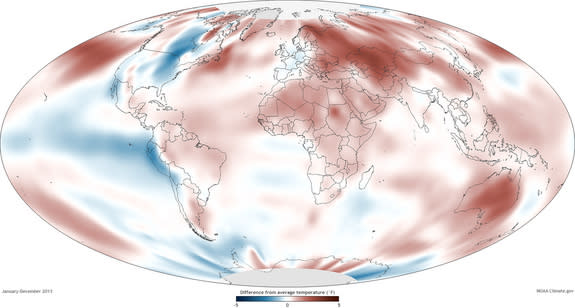
Climate data show that global temperatures in 2013 continued their long-term rising trend. In fact, 2013 was somewhere between the second- and sixth-hottest year on record for the planet since record keeping began in 1880, according to the climate report, released Thursday (July 17) by the National Oceanic and Atmospheric Administration (NOAA). (Four groups of scientists, who rely on slightly different methods to calculate global surface temperatures, ranked 2013 slightly differently compared with other years.)
The annual State of the Climate report compiles climate and weather data from around the world and is reviewed by 425 climate scientists from 57 countries. The report can be viewed online.
"You can think of it as an annual checkup on the planet," said Kathryn Sullivan, NOAA administrator.
And the checkup results show the planet ranged well outside of normal levels in 2013, hitting new records for greenhouse gases, Arctic heat, warm ocean temperatures and rising sea levels.
"The climate is changing more rapidly in today's world than at any time in modern civilization," said Thomas Karl, director of NOAA's National Climatic Data Center. "If we look at it like we're trying to maintain an ideal weight, then we're continuing to see ourselves put more weight on from year to year," he said.
Climate scientists blame rising levels of greenhouse gases, such as carbon dioxide, in the atmosphere for the planet's changing climate. The levels of carbon dioxide in Earth's atmosphere at Mauna Loa Observatory in Hawaii hit 400 parts per million (ppm) for the first time in 2013. The worldwide average reached 395.3 ppm, a 2.8 ppm increase from 2012, NOAA reports. (Parts per million denotes the volume of a gas in the air; in this case, for every 1 million air molecules, 400 are carbon dioxide.) [In Images: Extreme Weather Around the World]
"The major greenhouse gases all reached new record high values in 2013," said Jessica Blunden, a climate scientist with ERT, Inc., and a NOAA contractor who helped write the report.
Most parts of the planet experienced above-average annual temperatures in 2013, NOAA officials said. Australia experienced its warmest year on record, while Argentina had its second warmest and New Zealand its third warmest. There was a new high-temperature record set at the South Pole, of minus 53 degrees Fahrenheit (minus 47 degrees Celsius).
Read more: http://news.yahoo.com/climate-records-shattered-2013-132803953.html























